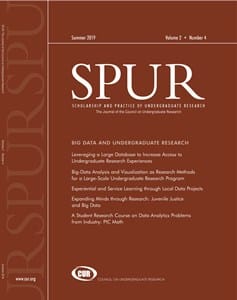SPUR (2019) 2 (4): https://doi.org/10.18833/spur/2/4/5
More Articles in this Issue
- Vignette‐ Ruth Kassel, Ting Liu, Daniel Moriarty, Caleb Ryor, and Graziano Vernizz
SPUR (2019) 2 (4): https://doi.org/10.18833/spur/2/4/4 - Vignette‐ Charissa Jefferson, Diego Mendez-Carbajo, and Katrina Stierholz
SPUR (2019) 2 (4): https://doi.org/10.18833/spur/2/4/3 - Practice‐ Diego Mendez-Carbajo and Stephanie Davis-Kahl
SPUR (2019) 2 (4): https://doi.org/10.18833/spur/2/4/8 Abstract:An increased focus on high-impact pedagogical practices at a small, residential, higher education institution led to a grant-funded project to gather and analyze multidimensional data on 10,155 residential foreclosures in central Illinois from 2006 to 2013. Student researchers applied skills gained through academic coursework to investigate a real-world issue in the local community and communicated their findings to a variety of stakeholders, including local governments, nonprofit organizations, banks, and social agencies. The direct assessment of 85 capstone-level research projects reveals that those with a community service focus displayed a stronger mastery by students of particular expected proficiencies relative to research projects with a traditional scholarly focus.
- Practice‐ Patrick J. Killion, Ian B. Page, and Victoria Yu
SPUR (2019) 2 (4): https://doi.org/10.18833/spur/2/4/7 Abstract:The University of Maryland–College Park initiated the First-Year Innovation & Research Experience (FIRE) in 2014 to provide authentic faculty-led research experiences, mentorship, and accelerated opportunity for first-year students from a wide range of academic backgrounds. To annually provide more than 600 new FIRE students with an authentic research experience that will prepare them to join any FIRE research group in their second semester, the program has iteratively developed, refined, and assessed a novel alternative to more traditional research methods courses. The course learning outcomes empower students to find, read, and understand primary literature; perform literature reviews; define and execute a novel research project with a strong focus on data analytics and visualization; and collaborate within the framework of a role-based team to deliver meaningful results.
- Practice‐ Randy B. Nelson, Kideste Mariam Yusef, and Adrienne Cooper
SPUR (2019) 2 (4): https://doi.org/10.18833/spur/2/4/10 Abstract:Bethune-Cookman University’s Center for Undergraduate Research Excellence has operated a summer research program since 2014. An interdisciplinary team of faculty mentors and student research fellows examined variables impacting juvenile delinquency and risk of recidivism within Florida, using a database of more than 64,000 youth who aged out of the Florida Department of Juvenile Justice from 2008 to 2013. In the first year, the students learned visual analytics and chi-square analysis as methods for studying big data. In 2017, the team employed an applied research approach based on the success of the Communities That Care delinquency prevention model to examine predictive and protective factors that affect juvenile risk of recidivism. The project provided undergraduates with an introductory framework for assessing, analyzing, and presenting big data.
- Article‐ Elizabeth J. Sandquist, Cinzia Cervato, and Craig Ogilvie
SPUR (2019) 2 (4): https://doi.org/10.18833/spur/2/4/9 Abstract:The Freshmen Research Initiative at Iowa State University promotes student interest and retention in science through introductory course-based undergraduate research experiences (CUREs). Successful strategies for the implementation of CUREs on a large scale in an affordable manner included the use of a postdoctoral coordinator and affiliation with student learning communities. Across multiple disciplines, students in single-semester introductory research courses reported personal gains related to research, to thinking and working like scientists, to attitudes and behaviors of a scientist, and to gains in skills as reported on the Undergraduate Research Student Self-Assessment. Key outcomes related to persistence in STEM, including self-efficacy and project ownership, were also suggested as early gains due to course-based research.
- Article‐ Merinda Kaye Hensley and Heidi R. Johnson
SPUR (2019) 2 (4): https://doi.org/10.18833/spur/2/4/11 Abstract:As libraries build in-house publishing programs, they can aid campus undergraduate research journal efforts in several ways. They may provide publishing platforms, archive student work such as multimedia, professionalize titles through activities such as assigning DOIs, and offer instructional training that introduces undergraduates to the content creation process. To better understand the current landscape of undergraduate research publications, this study establishes an index of undergraduate research journals for the United States across all disciplines. This article examines several qualitative characteristics from a sample size of the index, including the publication processes, the review process, intellectual property issues, journal professionalization, and library involvement. The authors also offer an outline of guiding principles that can assist faculty mentors and students in making decisions regarding the student publication process.
- Practice‐ Michael Dorff and Suzanne Weekes
SPUR (2019) 2 (4): https://doi.org/10.18833/spur/2/4/2 Abstract:The PIC Math program works with mathematical sciences faculty at US institutions to help them prepare students for careers in today’s workforce. PIC Math faculty engage their students to solve data science and other research problems that come directly from industry. To accomplish the program’s objectives, the authors conduct a three-day summer training workshop for faculty, provide resources and training so faculty can successfully teach a semester-long course in which students are mentored in solving a research problem, and organize a student summer recognition conference. In the first three years, 107 faculty members from 101 institutions, including 16 historically black colleges and universities and Hispanic-serving institutions, have participated in PIC Math. Faculty mentored 1,397 undergraduate students in research that came from more than 170 business and government agencies.


